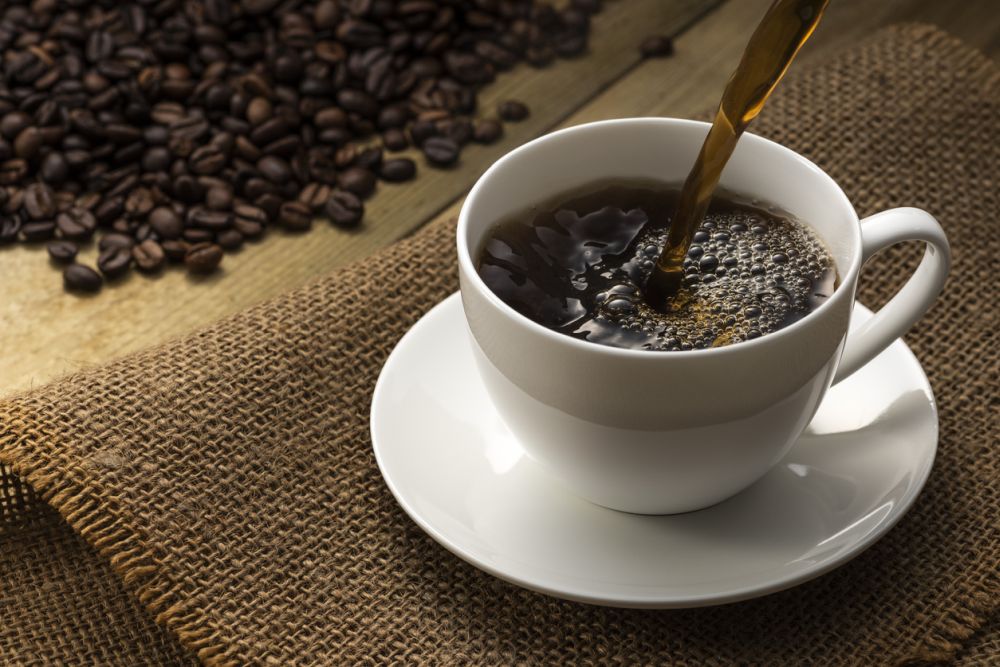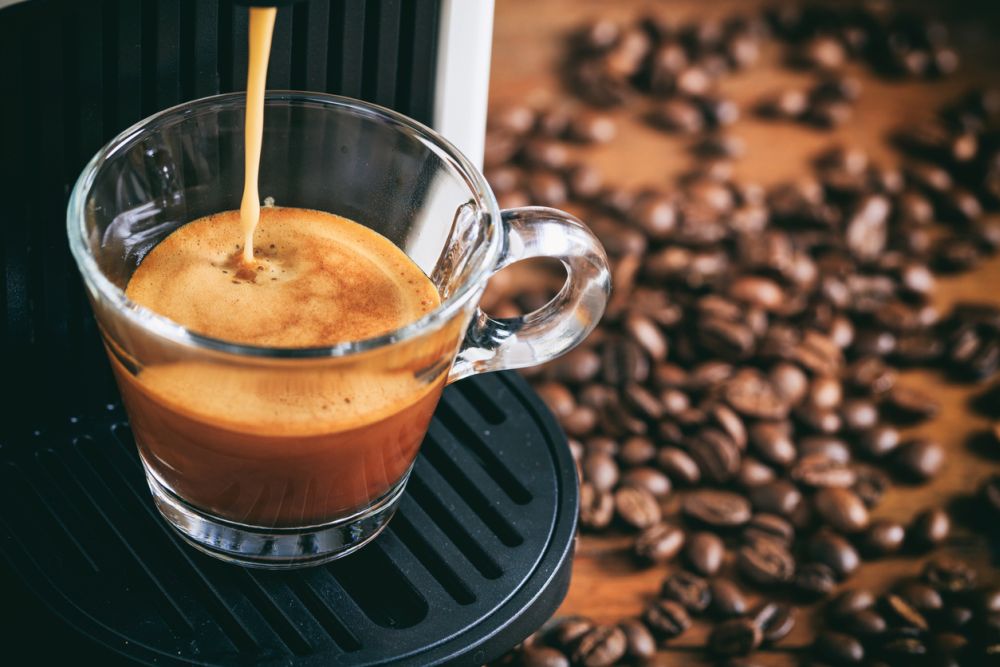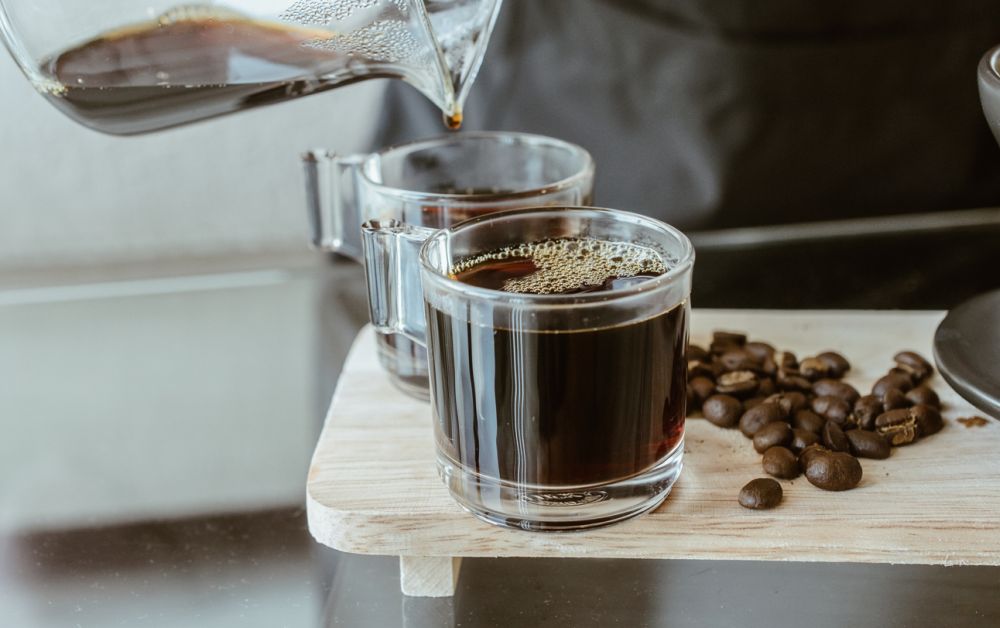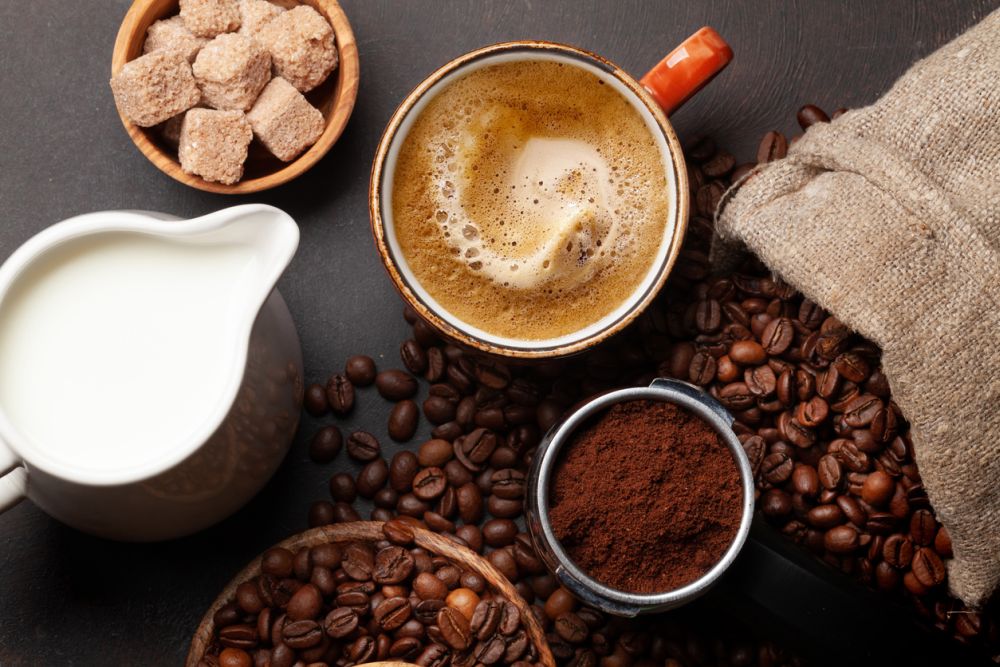Some coffee addicts prefer espresso while others go for black coffee. Without a doubt, they taste different. However, many are left wondering – is espresso black coffee? Keep reading to find out.

If you go on a stroll around the city, you’ll probably see multiple coffee places, each advertising its own version of the best coffee in town; from cappuccinos to iced coffees and frappuccinos – and the list goes on. However, if you ask coffee experts, you’ll find out that the best version is a simple cup of black coffee.
Some people enjoy coffee solely for the caffeine kick, which you can get from lattes, macchiatos, flat whites, and other coffee types.
However, if you’re a true connoisseur, you probably want your coffee pure and unadulterated. In this case, espresso or black coffee might be exactly what you need.
Table of Contents
- Is espresso black coffee?
- Espresso vs black coffee: What’s the difference?
- Why people usually take espresso black
- FAQ
- Verdict
Is Espresso Black Coffee?
Espresso is one of the most concentrated forms of coffee, so it makes sense why many people assume it’s the same as black coffee.
Although espresso and black coffee share some similarities, they’re not the same: espresso is a type of coffee, while black coffee is just a way of serving coffee.
It might help to understand a bit more about your coffee by comparing the two to see what sets them apart exactly.
What Is Espresso?
Espresso is made by forcing hot water under pressure through tightly-packed, finely-ground coffee beans; it results in a small amount of intensely flavored coffee.
The espresso coffee grounds are usually dark roast, which has less caffeine than lighter roasts. However, espresso is so concentrated that it has more caffeine per ounce than regular coffee.
Espresso is usually served in small quantities – around 1-2 ounces. And it’s often the base for other coffee drinks like cappuccinos, lattes, and mochas.
Unlike regular coffee, espresso usually requires special paraphernalia like an espresso machine and tamper.
You could make espresso without any special equipment, too, but it requires some serious elbow grease (or a very strong arm). Besides, low water pressure makes a terrible job of extracting the caffeine from the coffee grounds.
And it keeps water in contact with the coffee longer, which produces a very bitter cup of coffee. Additionally, you end up with something resembling espresso, but not the real deal.

What Is Black Coffee?
Black coffee is coffee served without any added milk, cream, or sugar. You can use any type of coffee bean and roast it to any desired level, and these two factors set the caffeine level: stronger or weaker.
However, black coffee typically has less caffeine than espresso since it’s diluted with water. We’re talking, of course, about the caffeine-to-water ratio, and not the actual content of caffeine.
Due to the prolonged brewing process, the actual content of caffeine can be higher in regular coffee than in espresso; it’s because water has more time to extract caffeine from the coffee grounds.
For the sake of accuracy and not over-complicating things, we’ll use regular black coffee as our reference.
As mentioned earlier, espresso is a type of coffee and black coffee is a way of serving coffee. So it wouldn’t be fair to compare the two. It would be like comparing a brand of whiskey to whiskey sour – one’s a drink, and the other’s a type of drink.
Black coffee is usually made by brewing ground coffee beans in hot water and filtering them out. Alternatively, you can pour boiling water over ground coffee beans and let them steep for a few minutes. Then you strain the coffee and serve it black – which means no sugar, cream, or other additives.
Plus, it’s possible to serve black coffee hot or cold, as well as to use it as the base for other coffee drinks like iced coffee, lattes, and cappuccinos.
Espresso vs Black Coffee: What’s the Difference?
Now that we know a bit more about espresso and black coffee, let’s see what sets the two apart.
1. Semantics
The biggest difference is that espresso is a type of coffee, while black coffee is simply a way of serving coffee. This might seem like a minor distinction, but it’s an important one.
2. Brewing Method
Espresso is made by forcing hot water under pressure through tightly-packed, finely-ground coffee beans. And this process delivers a small amount of intensely flavored coffee.
On the other hand, with regular black coffee, you generally brew ground coffee beans in hot water and filter the grounds out. The brewing process uses more water than in the case of espresso, which is why black coffee has a weaker flavor.

3. Roast Type
Espresso is usually made with dark roast coffee beans, while black coffee can be made with any type of bean and roasted to any level.
The longer the coffee beans are roasted, the darker they become, which also affects the coffee’s flavor. Dark roast coffees have a fuller body and a more intense flavor, while light roast coffees are more delicate and with a lighter body.
4. Serving Size
Espresso is generally served in small quantities, while regular black coffee is usually served in large cups or mugs. It’s because espresso is more concentrated and has a stronger flavor than black coffee.
5. Caffeine Content
Espresso has more caffeine per ounce than regular coffee since the brewing process is significantly shorter than in the case of regular coffee. It means that water has less time to extract caffeine from the coffee beans.
However, the actual content of caffeine in espresso is lower than in regular coffee, because espresso is diluted with water, while regular coffee is not.
Why People Usually Take Espresso Black
Now that we’ve gone over the key differences between espresso and black coffee, you might be wondering why people usually take espresso black.
The main reason is that the intense flavor of espresso can be muted by diluting it with milk or cream. Additions ruin the espresso experience for many people, which begs the need to serve it black.
Furthermore, putting various additions such as milk, spices, syrups, and sweeteners into espresso would create a completely different drink. Thus, it’d be easier just to order a different espresso-based drink, such as a cappuccino or a latte if that’s what you want.
Another reason people take espresso black is that milk changes the appearance of espresso. Adding milk creates a foamy layer on top of the espresso, which prevents you from seeing the beautiful crema just waiting to be admired.
On the other hand, you can appreciate the full color of black espresso, together with its unique crema. And the oils released from the coffee beans have a chance to come through when taking espresso black.

How to Make the Perfect Black Espresso
- Use high-quality coffee beans for espresso – we recommend freshly ground dark roast beans.
- Pay attention to the grind size – if the grind is too fine, the espresso will be over-extracted and taste bitter. Otherwise, if the grind is too coarse, the espresso will be under-extracted and taste sour.
- Properly calibrate your espresso machine by setting the boiler temperature correctly and checking the grind size.
- Measuring coffee is essential for black espresso, so be sure to use the 1:2 coffee-to-water ratio – for every gram of coffee, you’ll need two grams of water. So, you need 8 to 20 g of coffee to make a single shot of espresso or 36 to 40 g for a double shot.
- Set the brewing time to 25 to 30 seconds. If it takes longer than 30 seconds to brew, it’s probably over-extracted and will taste bitter. Anything less than 25 seconds, creates an under-extracted espresso with a sour taste.
- Enjoy your espresso by taking small sips to savor the flavor. Be sure to pay attention to the body, acidity, sweetness, and bitterness so that you can take it all in.
- If the black espresso is too strong, add a bit of water to dilute it. Although you can also add milk or cream, it’s best to try it black first.
Tips for Enjoying Black Espresso
If you’ve been mesmerized by the dark magic that black espressos emanate, you might want to learn a thing or two before diving into it.
Firstly, black espresso is an acquired taste. Much like other drinks and brews with specific flavors, black espressos are creamy, velvety, and most of all, bitter. However, bitter doesn’t mean they lack flavor. Au contraire, black espresso is one of the most flavored-rich caffeinated drinks you could enjoy.
You may have wondered why various coffee places serve every cup of black espresso with a bottle of flat water. Well, the water is there to help you cleanse your palate in between sips. This ensures you can fully enjoy the espresso’s every flavor profile.
Secondly, black espresso is not only a drink but a whole experience. So make sure to take your time and be mindful of every sip; take small gulps and let the drink linger in your mouth for a few seconds before swallowing. It will give you enough time to enjoy the flavor and aroma.
Pay attention to how the espresso feels in your mouth and how the flavor develops over time. Savor its every nuance, from the initial bitterness to the aftertaste.
And, last but not least, don’t be afraid to experiment! Try different brewing methods, grind sizes, and beans to find a black espresso and make it your own.

What Influences the Taste of Black Espresso
Let’s take a closer look at what makes black espresso one of a kind:
Bean Type
Different beans have different flavor profiles, so it’s important to choose a bean that completely satisfies you. If you’re unsure, we recommend trying various bean types to see which you like best.
Brewing Method
Pump pressure, steam pressure, and gravity are common brewing methods for black espresso. Each produces a unique flavor profile, so go with the method that creates the most fantastic taste for you.
Grind Size
The finer the grind, the more intense the flavor. Conversely, the coarser the grind, the more mellow the flavor.
So, if you prefer an intense flavor, go with a finer grind. Or, if you want a gentle-tasting black espresso, pick a coarser grind.
Water Quality
Poor quality water creates a bad-tasting espresso, so it’s best to avoid tap water or water from uncertain sources. We recommend using filtered or distilled water to get the best possible taste for your black espresso.
FAQ
Learn more information about espresso and black coffee.
Is black coffee and espresso the same thing?
No, espresso is not the same as black coffee. Espresso is a type of coffee made by forcing hot water through finely-ground coffee beans. Black coffee is any type of coffee that has been brewed and then left black (without milk or sugar).
Is black coffee stronger than espresso?
No, black coffee is not necessarily stronger than espressos. The strength of coffee usually depends on the amount of coffee used, not the brewing method. However, regular coffee tends to have more caffeine per ounce, due to the brewing method used.
What is healthier black coffee or espresso?
Considering that espresso in its rawest form is also a type of black coffee, the answer is none and both. It depends on how you take your coffee. If you add milk and sugar to your espresso, it will have more calories than black coffee (any type). However, black espresso might be a healthier choice.
Can espresso make black coffee?
In theory, yes. Espresso is made by forcing hot water through finely-ground coffee beans. Black coffee refers to any type of coffee unsweetened and without any additions. Brewing plain espresso counts as black coffee.
 froastf
froastf
Is espresso close to black?
Yes, espresso is the closest coffee to black.
How many calories are in black espresso?
A typical 2 oz serving of black espresso has only 5 calories.
Is espresso just strong coffee?
Espressos are a concentrated form of coffee that’s made by driving high-pressured hot water through finely-ground coffee beans. The result is a strong, small shot of coffee with a bold flavor.
How do I make black espresso?
The best way to make black espresso is by using a pump pressure machine. If you don’t have one of these machines, you can use a steam pressure or a gravity machine.
What are the benefits of black espresso?
Some potential benefits of black espresso include improved mental alertness, reduced risk of death from cardiovascular disease, and reduced risk of Parkinson’s disease. It’s important to note that these benefits are largely based on research done on coffee in general, and not specifically on black espresso.
Verdict
All things considered, despite the confusing semantics in this situation, we hope you learned something useful from our guide. In short, any type of coffee can be black, but not any type of coffee is espresso.
To simplify, an espresso without any bells and whistles (sugar, cream, spices, etc) still counts as black coffee. So technically, yes, espresso is black coffee if you don’t add anything to it.
However, just because it’s black coffee doesn’t mean it’s stronger or has more caffeine. It just has a bolder taste due to the fact that it’s in its rawest, most unadulterated form.
Leave a Reply